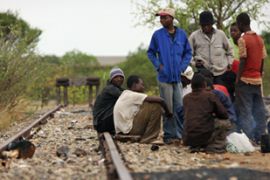Zimbabwean cholera deaths rise
UN says more than 50 people die in one day, as disease spread fails to be controlled.

About 200 Zimbabweans have been treated for the disease at the South African border town of Musina in the past two weeks.
Another 1,000 people have been provided with life-saving rehydration treatment at the health facility there.
‘Unreported cases’
The UN said that 8,887 cases of the disease have been recorded across half of Zimbabwe.
The Independent, a British newspaper, quoted a senior official in the health ministry as saying that more than 3,000 people had fallen victim to the disease.
Dr Douglas Gwadziro, the chairman of Doctors for Human Rights, a Zimbabwean group, said on Tuesday that about 10 per cent of people contracting the disease die.
Gwadziro said that those dying at home may not be recorded.
Cholera is spread by water containing human faeces. Zimbabwe’s sewerage system has broken down in many areas and access to clean water is proving increasingly difficult to come by, if at all accessible, in the past two weeks.
Hospitals closing
The country’s health system has also collapsed, with some hospitals closing due to lack of finance, and many people have gone without treatment.
As the rainy season approaches the disease may become more widespread. Rain is already moving raw sewage into water supplies in Harare, the capital.
Poor sewage treatment and water purification are being blamed for the outbreak in Zimbabwe.
These need to be reversed to contain the infection.
The disease is the latest in a litany of crises faced by Zimbabwean citizens under Mugabe’s increasingly dictatorial rule.
For most of this year the south-east African nation has suffered a political deadlock, with a post-election power-sharing deal between Mugabe and Morgan Tsvangirai, the opposition leader, failing to be ratified.
Official inflation is at 231 million per cent, although the real rate is higher, pushing the price of the most basic provisions out of many people’s reach.